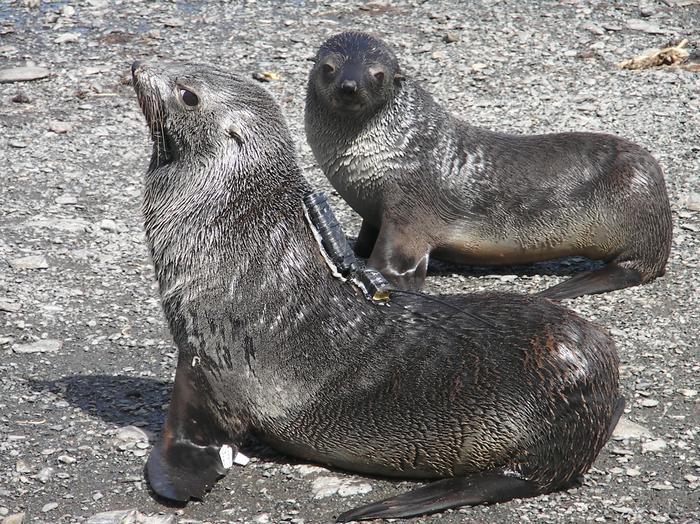In recent years, the innovative field of biologging has begun to transform our understanding of marine ecosystems. The technique, which involves equipping wild animals with sensors and cameras to collect data on their behavior and interactions with the environment, is proving vital for researchers eager to tackle pressing oceanic challenges. By capturing crucial information regarding animal health and habitat conditions, scientists are inching closer to unraveling the complex web of human influence on marine life.
One of the foremost proponents of this approach is IWATA Takashi, an ecologist affiliated with Kobe University, whose recent review emphasizes the importance of integrating diverse data sources to better understand the multidimensional impacts humans have on marine environments. The proliferation of anthropogenic activities—exemplified by overfishing, pollution, and noise disruptions—has made it imperative for researchers to monitor marine species and their habitats continuously. The ocean, with its vast expanse and intricate systems, poses notable challenges for scientists aiming to collect comprehensive, real-time data.
Iwata underscores the limitations faced by traditional research methods, which often rely on extensive vessel-based sampling and satellite imagery. While these tools provide valuable insights into broad environmental conditions, they leave significant gaps in localized data, especially in areas that are difficult to access, such as beneath sea ice or during inclement weather. This realization has brought biologging to the forefront, allowing scientists to engage directly with the environment of marine species and obtain real-time data from their unique perspectives.
By keeping the weight of biologging devices to less than 3% of an animal’s body weight, researchers strive to minimize any adverse effects on the animals being monitored. As technology evolves, the devices are becoming increasingly compact and efficient, enabling more detailed observation without jeopardizing animal welfare. This delicate balance ensures that the data collected reflects the true behavior and environmental interactions of marine organisms, providing a more accurate depiction of their life in an ever-changing world.
The review published in the journal Water Biology and Security highlights a diverse array of insights gained through biologging studies. For example, researchers have improved typhoon predictions, identified how different turtle species respond to plastic pollution, revealed illegal fishing practices, and assessed the environmental impacts of offshore wind farms on avian populations. These findings demonstrate the capacity of biologging to address various environmental issues while complementing existing methodologies.
Iwata and his team emphasize that the full potential of biologging can only be realized through enhanced global collaboration and data sharing. The aspiration is to establish an “Internet of Animals,” where a vast network of biologging data is collected, shared, and analyzed across disciplines and geographic boundaries. For this vision to become a reality, researchers must work together to overcome obstacles related to data compatibility and accessibility. The team at Kobe University advocates for clearer standards to facilitate better integration of data from differing biologging platforms.
One of the most compelling aspects of this research is how it fundamentally reframes the conversation surrounding marine conservation. Traditionally, conservation efforts have relied on human intervention and top-down policy-making. In contrast, biologging encourages a dynamic dialogue that positions animals as active participants in the discussion. By interpreting the behavioral data collected through biologging, researchers are gaining insights into species’ responses to environmental stressors and can inform policy decisions grounded in the realities of marine life.
The implications of biologging extend beyond marine species, influencing conservation efforts for terrestrial animals as well. By understanding interspecies interactions and the cumulative impacts of human activity, wildlife managers can design more effective and nuanced strategies that promote conservation in a holistic manner. This interconnectivity reinforces the necessity for an integrated approach to wildlife science, which places equal emphasis on animal and habitat health.
Despite its potential, the field of biologging is still maturing. Researchers are continuously exploring innovative means to refine data collection techniques and analyses. As biologging technology becomes more advanced, the scope of research questions that can be addressed will expand exponentially—an exciting prospect for the future of environmental science. Moreover, the collaborative nature of this research fosters an open exchange of ideas and methods among experts, leading to a richer understanding of ecological dynamics.
Iwata’s call to action through this review seeks to inspire not only fellow scientists but also the broader public. The increasing visibility of biologging studies and their findings can help raise awareness of marine conservation and encourage a wider community to engage in the stewardship of our oceans. By promoting bioliteracy and fostering appreciation for marine ecology, society can play a crucial role in supporting sustainable practices and policies that benefit both wildlife and people.
As the world edges closer to critical tipping points amidst climate change, biologging stands out as a beacon of hope, with the potential to reshape our understanding of marine ecosystems. The data-driven focus championed by Iwata and his colleagues promises a future where decisions regarding marine conservation can be both informed and impactful. The next step in this journey is clear: harnessing the power of collaboration to build an interconnected network of insights that will safeguard the ocean’s inhabitants and their environments for generations to come.
Subject of Research: Animals
Article Title: Biologging as a Potential Platform for Resolving Ocean Environmental Issues and Threats: Towards the Development of the Internet of Animals
News Publication Date: 7-Mar-2025
Web References: 10.1016/j.watbs.2025.100383
References: N/A
Image Credits: IWATA Takashi
Keywords: Biologging, marine life, conservation, data integration, environmental science, animal behavior, Internet of Animals.




